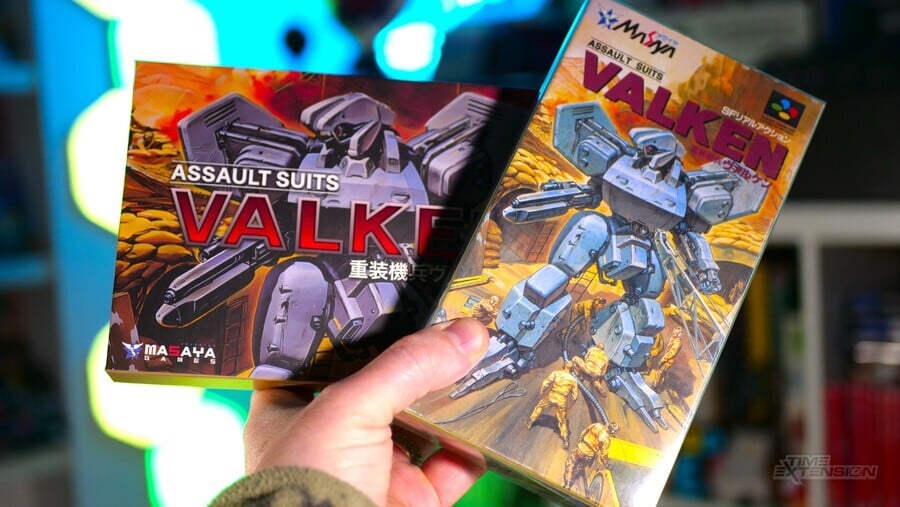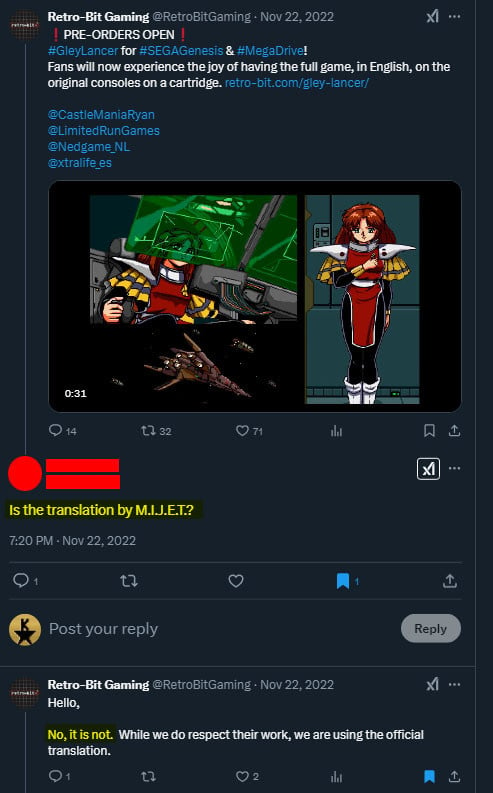
Update []: Retro-Bit has given us the following statement:
We (Retro-Bit) have had success working with a number of translators and programmers to deliver each release. Unfortunately, due to schedule conflicts, we are not always able to work with them on every title. The translator who worked on these titles has a portfolio of translating entire text-heavy games, so we believed he was capable of our translation request since they were games that contained less text. We reached out to the translator for their explanation regarding these claims. After our discussion internally we as Retro-Bit concluded that the final work submitted contained, to a lesser or higher degree, uncredited work. We’ve always had a successful understanding of our shared responsibilities with our collaborators and unfortunately in this instance, we let our guard down.
This was an irresponsible oversight on our end and we take full accountability for this outcome and not verifying the submitted translation. To amend this situation, we will set out to reach those whose work was not recognized to offer a means of resolution.
Although we have upcoming titles that we are excited to release that have never been localized, we will be delaying them to refine our translation and programming procedures to ensure this does not happen again. One of the most rewarding parts of doing these re-releases is collaborating with many talented members of the retro gaming community while being able to support the original developers. Our intent was never to take advantage of that relationship and we apologize for disappointing our fans.
We deeply value the retro gaming community and appreciate your ongoing support and patience as we improve our processes.
Original Story: Retro-Bit, a company which has a long history of re-releasing old-school titles in physical form, has been accused of plagiarising fan-translations—despite its insistence that its localisation efforts are totally bespoke.
Translator Krokodyl has amassed a staggering amount of evidence to back up this claim and has cited four titles which prove it: Shubibinman Zero / Shockman Zero, Assault Suits Valken, Gley Lancer and Majyūō: King of Demons.
The post is worth viewing, as it's quite lengthy and includes an overwhelming amount of information and evidence. To summarise, Krokodyl highlights elements such as copied fonts, near-identical translated text and errors which appear both in the plagiarised translation and Retro-Bit's releases. Krokodyl also uses special tools to analyse and compare hex data to see how closely the two match. It's pretty damning stuff, and it would be amazing if all of this were merely a coincidence.

One of the most compelling pieces of evidence relates to Gley Lancer, which, Krokodyl alleges, is based on MIJET's translation from 2006. The game includes both an English and Japanese script (something Retro-Bit itself fails to note), and MIJET's name appears in the Japanese version of the game's "good" ending—which Retro-Bit's translator clearly didn't read properly.
It's important to note that with all four of these games, Retro-Bit has publicly stated that it has not used any existing translation for its versions. The credits on Retro-Bit's games all list the same person as the translator.




"I suspect that several of retro-bit’s releases presented as new and original translations of old SNES and Genesis games are, in fact, plagiarism of existing fan translations or, in at least one instance, other official translations," concludes Krokodyl. "By plagiarism, I mean that they’ve used graphics, code and/or texts from pre-existing translations while claiming otherwise."
Krokodyl notes that Aeon Genesis—the translator behind Assault Suits Valken and Majyūō: King of Demons' previous fan translations—has worked with Retro-Bit in the past and has always been credited. However, Aeon Genesis was not involved with any of these releases, nor were MIJET (Gley Lancer) or Svambo (Shockman Zero), as Krokodyl has reached out to all three and asked.
While Krokodyl admits that some of the evidence could be circumstantial, "having translated about a dozen games from Japanese to English over the last few years as an amateur translator and a professional developer, I am utterly convinced that these four translations by retro-bit use previous fan translations extensively in terms of graphics, game code and scripts. I am convinced that they are not original Japanese to English translations, and can only exist because of previous translations."

Krokodyl also points out that, even if these translations had been acquired legally, "the claim of not using existing work would be false advertisement. You can’t have it both ways. I believe that the FAQ that claims that 'a talented programmer' is working on the translations from scratch is a blatant lie. They’re not working from scratch and they are not talented. My understanding is that the translations are commissioned and not done in-house."
Long-standing readers of Time Extension will note that we've covered Retro-Bit's releases in detail in the past. The company has always been kind enough to supply us with pre-release copies of its titles and has helped organise giveaway competitions via social media. In light of these accusations, we will be reviewing this relationship moving forward.
We have also reached out to Retro-Bit over the weekend for a statement and will update this piece when we hear back.
